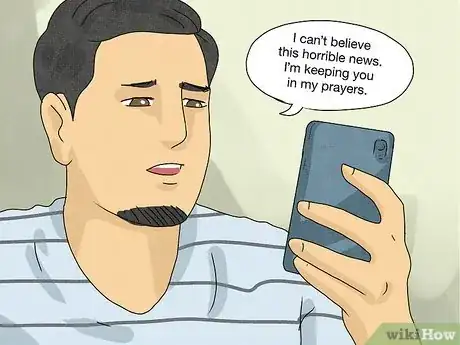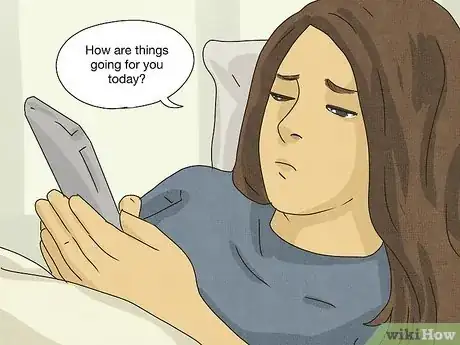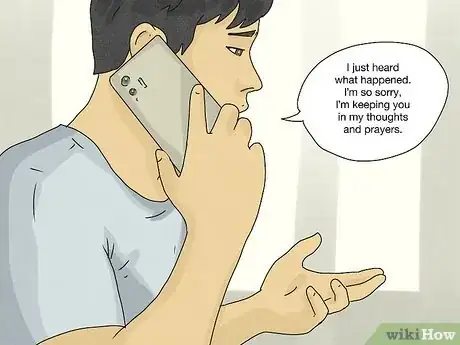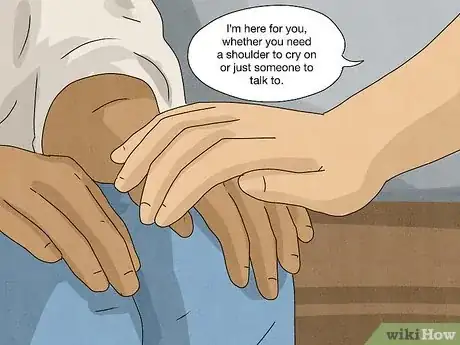This article was co-authored by Rebecca Tenzer, MAT, MA, LCSW, CCTP, CGCS, CCATP, CCFP and by wikiHow staff writer, Dan Hickey. Rebecca Tenzer is the owner and head clinician at Astute Counseling Services, a private counseling practice in Chicago, Illinois. With over 18 years of clinical and educational experience in the field of mental health, Rebecca specializes in the treatment of depression, anxiety, panic, trauma, grief, interpersonal relationships using a combination of Cognitive Behavioral therapy, Psychodynamic therapy, and other evidence-based practices. Rebecca holds a Bachelor of Arts (BA) in Sociology and Anthropology from DePauw University, a Master in Teaching (MAT) from Dominican University, and a Master of Social Work (MSW) from the University of Chicago. Rebecca has served as a member of the AmeriCorps and is also a Professor of Psychology at the collegiate level. Rebecca is trained as a Cognitive Behavioral Therapist (CBT), a Certified Clinical Trauma Professional (CCTP), a Certified Grief Counseling Specialist (CGCS), a Clinical Anxiety Treatment Professional (CCATP), and a Certified Compassion Fatigue Professional (CCFP). Rebecca is also a member of the Cognitive Behavioral Therapy Society of America and The National Association of Social Workers.
There are 7 references cited in this article, which can be found at the bottom of the page.
This article has been viewed 178,279 times.
We hope we never have to, but eventually, we all have to be there for someone after their loved one passes away. What can you even say in such a sad situation? There’s no perfect or “right” thing to say, but you can comfort a person in grief by expressing your sympathy, checking in on them, and sharing memories while they process their loss. We’ve put together a helpful list of things to say when someone passes away so you can support the people you care about while they grieve. Keep reading if you’re ready to reach out.
Steps
“I’m sorry for your loss.”
-
Express your sincere concern with a simple condolence. It might sound generic, but it lets the grieving person know you’re sympathetic to what they’re going through. Keep it simple for acquaintances, or add more thoughtful support for someone closer to you.[1] X Trustworthy Source HelpGuide Nonprofit organization dedicated to providing free, evidence-based mental health and wellness resources. Go to source
- “I’m so sorry to hear about your loss.”
- “I’m sorry to hear this horrible news.”
- “I’m saddened to hear about what happened. I’m keeping you in my thoughts.”
“I can’t imagine how you’re feeling right now.”
-
Show sympathy without comparing their feelings to your own experience. “I know how you feel” can make someone feel less understood or more alone. Everyone grieves differently, and even if you’ve experienced loss, the grieving person’s circumstances and dynamics are different than yours were.[2] X Research source
- “I can’t imagine how difficult this must be for you.”
- “I won’t pretend to know how you’re feeling. I’m always here if you want to talk.”
- “I can’t even fathom how much this hurts. I’m so sorry you’re going through this.”
“I’m so very sorry your uncle died.”
-
Use the word “died” to show you're OK to talk about death. Many people have an instinct to dance around what happened to avoid sounding insensitive. Be direct and show you’re open to talking about death and dying. Chances are the grieving person will open up more if you feel at ease with the subject.[3] X Trustworthy Source HelpGuide Nonprofit organization dedicated to providing free, evidence-based mental health and wellness resources. Go to source
- “I’m so sorry to hear your brother died.”
- “I’m so sad to hear Beverly died yesterday. I’m thinking about you!”
- “I just heard about your aunt dying. I’m so sorry.”
“This is such horrible news.”
-
Acknowledge the gravity of the loss without offering the “upside.” Positive phrases like “At least they’re not suffering anymore” or “You have so much still to be thankful for” might seem comforting, but they do little to console a grieving person who wishes their loved one was still with them.[4] X Trustworthy Source HelpGuide Nonprofit organization dedicated to providing free, evidence-based mental health and wellness resources. Go to source
- “This is so sad! Please know I’m always here for you.”
- “This must be devastating for you. I’m so, so sorry.”
- “I can’t believe this horrible news. I’m keeping you in my prayers.”
“How are you doing today?”
-
Ask how they feel to check in and gauge how to continue the conversation. It’s a simple way to start a conversation if you’re unsure what else to say. Notice how they respond—they might want to talk about light, distracting things, or they may be ready to talk about how they’re really doing.[5] X Research source
- “How are things going for you today?”
- “How are you holding up?”
- “I hope you’re doing OK today.”
“I’m thinking of you.”
-
Let the bereaved know they’re in your thoughts while they grieve. Many people in grief have a hard time reaching out and need others to put in the effort. Tell them you’re thinking about them when you hear the bad news, but also in the following weeks and months as they adjust to life without a loved one.[6] X Trustworthy Source Harvard Medical School Harvard Medical School's Educational Site for the Public Go to source
- “I’m thinking about you and your family.”
- “I’m keeping you in my thoughts while you find your way through this.”
- “I just heard what happened. I’m so sorry, I’m keeping you in my thoughts and prayers.”
“I’ll keep you in my prayers.”
-
If they’re religious, comfort the grieving person with a spiritual condolence. Someone’s church or faith can be a pillar of support for them during trying times like the death of a loved one. Let them know you’re praying for them or that God will help them through this trying time.[7] X Research source
- “I’m praying for you and your loved ones.”
- “May God be with you in this incredibly sad time.”
- “We’re praying that you find a way to get through this trying time.”
“I’m here to listen.”
-
Support someone in grief by listening to their stories and feelings. A sympathetic ear goes a long way towards making someone feel better since many people need to talk or vent aloud to navigate their grief. Let them know you’re a safe space for them to let it all out and focus on listening non-judgmentally.[8] X Trustworthy Source Harvard Medical School Harvard Medical School's Educational Site for the Public Go to source
- “I’m here for you, whether you need a shoulder to cry on or just someone to talk to.”
- “You can always hit me up to chat. Please don’t hesitate to reach out.”
- “I’m here to listen anytime. If you ever want to talk, just let me know.”
- It’s best to be a listener rather than a speaker to ensure you’re not saying anything offensive while letting them know you want to help them through the grieving process.
“I’ll bring you dinner tonight.”
-
Offer to do a favor or run an errand for the grieving person. Asking “How can I help?” is thoughtful, but sometimes it puts pressure on the bereaved to figure out what they need when they’re not sure. Tell them what you’d like to do for them, or offer some assistance and ask if that’s something they’d like.[9] X Trustworthy Source HelpGuide Nonprofit organization dedicated to providing free, evidence-based mental health and wellness resources. Go to source
- “I’m making lasagna tonight, I’ll bring some over to you.”
- “I was thinking I’d come over to mow the lawn for you this weekend, is that OK with you?”
- “Let me drive the kids to school this week. I’m happy to help any way I can!”
“I have so many fond memories of them.”
-
Share warm memories of the deceased to lift a grieving person’s spirits. They’ll be comforted knowing that others miss their loved one as well, and chances are you’ll bring them joy by reminiscing on the good times you had with them. Think about the memories that stand out the most, or the feelings or thoughts that are attached to those memories.
- “My favorite memory of your grandpa is the time he took us fishing when we were kids.”
- “I remember the time your mom caught us trying to get back into your house after we snuck out. Nothing ever got past her!”
- “I’ll never forget how supportive John was when I was recovering from surgery a few years ago. He was such a kind man.”
“They had such an impact.”
-
Remember the deceased and tell stories about the lives they touched. It’s incredibly uplifting for a grieving person to hear how their loved one inspired, helped, or influenced a person or community. It shows the bereaved that they’re not alone in missing and appreciating them.[10] X Research source
- “Alaya’s dedication to her students was unmatched. We were all so lucky to learn from her.”
- “Dr. Owens was a pillar of this town. I don’t know a single person that didn’t look forward to seeing her creative costumes in the Halloween parade every year.”
- “Your brother was such a kind man to everyone. He showed me what it means to give back to a community.”
“I’ll miss Sasha.”
-
Say the deceased’s name to keep their memory alive. Using the dead person’s name reassures the grieving person that their loved one won’t be erased from all conversations. It’s also comforting for them to know that they’re not the only one who misses them.[11] X Trustworthy Source Harvard Medical School Harvard Medical School's Educational Site for the Public Go to source
- “I miss Dale so much. He was such a kind man.”
- “Veronica was one in a million. I’ll miss her.”
- “I still think about Ms. Hill. She was the greatest teacher I ever had.”
“They were such a wonderful person.”
-
Say kind things about the deceased to share their positive impact on you. It doesn’t have to be super specific if you didn’t know them well. Acknowledging their kindness, humor, or generosity humanizes their memory, and it comforts their loved ones to hear praise from those who knew them.[12] X Research source
- “No one ever made me laugh harder at a party than Alannah.”
- “Your grandmother was one of the smartest people I ever met.”
- “I loved coming to your house as a kid. Your dad was always so welcoming.”
“Take as long as you need to grieve.”
-
Reassure the bereaved there’s no correct amount of time to grieve. Everyone processes loss differently, but many people feel pressured to “bounce back” quickly. Offer them hope and sympathy by telling them to feel their feelings for as long as they need to—they’ll move on when they’re ready.[13] X Trustworthy Source Harvard Medical School Harvard Medical School's Educational Site for the Public Go to source
- “Take your time. One day, you’ll find a way through this.”
- “No one’s expecting you to feel better any time soon. Take as long as you need to process this.”
- “Take as long as you need. There’s no timeline for what you’re going through.”
“Your feelings are valid.”
-
Show the grieving person you don’t judge them for their feelings. They might be feeling depression, anger, shock, denial, bitterness, or any combination of these things and more. It might even be directed at the deceased person. Resist telling them to move on and let them feel what they feel.[14] X Research source
- “There’s no right thing to feel at a time like this.”
- “Whatever emotions you’re experiencing right now are correct.”
- “It’s OK to feel that way. No one expects you to act a certain way during all this.”
“It’s OK to cry if you need to.”
-
Let the grieving person know they’re safe to express themselves around you. Many people feel pressure to hide their tears or put on a “strong face” when they experience loss. Accept their feelings and tell them they can cry in front of you without fear of judgment or criticism.[15] X Trustworthy Source HelpGuide Nonprofit organization dedicated to providing free, evidence-based mental health and wellness resources. Go to source
- “Cry as much as you want. I’m here for you regardless.”
- “It’s OK to let it all out!”
- “Never be embarrassed to cry. You’re going through a hard time.”
“I don’t know what to say.”
-
Be honest when you’re not sure what the right thing to say is. It’s OK to not know! The important thing is to be sincere and keep communication open with the grieving person. Remember, there is no “right” thing to say.[16] X Research source
- “I’m not sure what to say. I’m so sorry.”
- “I’m at a loss for words.”
- “I wish I could find the right words to say. I’m here for you, whatever you need.”
Warnings
- Don't turn the attention to yourself. Doing so can cause the person to be confused and even upset, and that certainly does not help the person in their grief.⧼thumbs_response⧽
- Avoid giving advice unless asked for it. The easy thing is to give advice and try to fix the person's grief, but this can only make the situation worse for the grieving person than it already is.⧼thumbs_response⧽
You Might Also Like
 How to Write a Touching Obituary
How to Write a Touching Obituary
 Fake Your Death: How to Disappear Without a Trace
Fake Your Death: How to Disappear Without a Trace
 What to Say When Someone’s Mom Dies
What to Say When Someone’s Mom Dies
 How to Clean a Gravestone: Gentle Ways to Remove Moss, Lichen, and More
How to Clean a Gravestone: Gentle Ways to Remove Moss, Lichen, and More
 35+ Rememberance Messages for a Death Anniversary (Plus What Not to Say)
35+ Rememberance Messages for a Death Anniversary (Plus What Not to Say)

 How to Comfort Someone Who Lost a Pet: 15 Things to Say
How to Comfort Someone Who Lost a Pet: 15 Things to Say





 15 Things to Say in a Pet Sympathy Card
15 Things to Say in a Pet Sympathy Card

References
- ↑ https://www.helpguide.org/articles/grief/helping-someone-who-is-grieving.htm
- ↑ https://rightasrain.uwmedicine.org/life/relationships/how-to-support-someone-grieving
- ↑ https://www.helpguide.org/articles/grief/helping-someone-who-is-grieving.htm
- ↑ https://www.helpguide.org/articles/grief/helping-someone-who-is-grieving.htm
- ↑ https://www.psychologytoday.com/us/blog/supersurvivors/201906/whats-the-right-thing-say-when-someone-is-grieving
- ↑ https://www.health.harvard.edu/mind-and-mood/ways-to-support-someone-who-is-grieving
- ↑ https://www.psychnewsdaily.com/condolences-how-to-write-a-condolence-message/#religious-condolence-messages-may-he-rest-in-peace-and-beyond
- ↑ https://www.health.harvard.edu/mind-and-mood/ways-to-support-someone-who-is-grieving
- ↑ https://www.helpguide.org/articles/grief/helping-someone-who-is-grieving.htm
- ↑ https://www.goodto.com/family/what-to-say-when-someone-dies-551732
- ↑ https://www.health.harvard.edu/mind-and-mood/ways-to-support-someone-who-is-grieving
- ↑ https://www.goodto.com/family/what-to-say-when-someone-dies-551732
- ↑ https://www.health.harvard.edu/mind-and-mood/ways-to-support-someone-who-is-grieving
- ↑ https://rightasrain.uwmedicine.org/life/relationships/how-to-support-someone-grieving
- ↑ https://www.helpguide.org/articles/grief/helping-someone-who-is-grieving.htm
- ↑ https://psychcentral.com/health/what-to-say-to-someone-grieving#things-to-say
About This Article































































